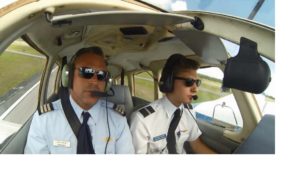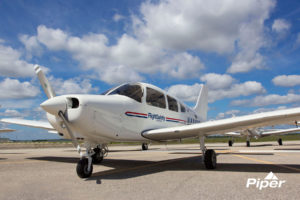By Julie Boatman Filucci
What do talents in the boardroom have to do with successfully and safely commanding an airliner full of passengers? More than you might expect.
“Above all, it is leadership,” says Dr. Stephen Brown, dean of the College of Business, Humanities and Social Sciences at the West Virginia University Institute of Technology (WVU Tech). “By understanding how to manage teams and communicate effectively, prospective pilots enhance not only their capabilities in the cockpit but also make themselves more valuable to their airline employers.”

A recently launched bachelor of science degree in aviation management at WVU Tech marries Tech’s robust business management curriculum with world-class flight training, delivered by program partner FlightSafety International’s training academy in Vero Beach, FL. Students can complete the core curriculum online and then take advantage of great flying weather in Florida to push ahead in their flight training. Graduates first secure a commercial pilot certificate, then go on to work as flight instructors for FlightSafety or flight schools in West Virginia while continuing to fly toward an airline transport pilot certificate.
Because airline pilots can choose to a certain extent where they want to live, graduates can return to West Virginia to make it their home base—and the folks at WVU Tech have evidence of that. Though the program matching Tech with FlightSafety is new, Frank Robbins, aviation program manager at WVU Tech, has seen it in action.
“The pilot lives in West Virginia and spends his money in West Virginia,” says Robbins, a former aviation student now flying a Boeing 747 for cargo airline Kalitta Air. “He uses his degree to make the jump from little planes to big planes and big money.”

Graduates of the program have many options besides the life of an airline pilot. West Virginia hosts a network of regional and county airports full of opportunity for a person with both a business degree and pilot skills. In fact, the Aircraft Owners and Pilots Association lists 125 public and private airfields in the state.
“A career in aviation can be so much more than flying,” says Katie Pribyl, senior vice president of aviation programs and strategy for the Aircraft Owners and Pilots Association and a one-time airline pilot herself. “Airports need leaders who understand the realities of aviation operations, FAA requirements and business management. Businesses on those airports, like fixed-base operators, flight schools and charter operations, depend on a combination of aviation and business savvy for success. Large corporations need people to manage their aircraft and flight departments, and an anticipated shortages of pilots, aerospace engineers and other aviation professionals are even spurring demand for teachers who understand both aviation and the needs of employers to help prepare high school students for future aviation careers.”
Satisfying work as an airport manager, commissioner or business owner at one of these critical transportation hubs may be just the right career for a young person ready to give back to the place that raised them.
 About the Author
About the Author
Julie Boatman Filucci is an aviation educator, author and technical editor based in Colorado and Portugal. She is the co-founder and senior managing director for the International Higher Education Group, LLC.








